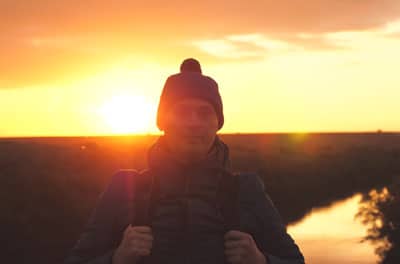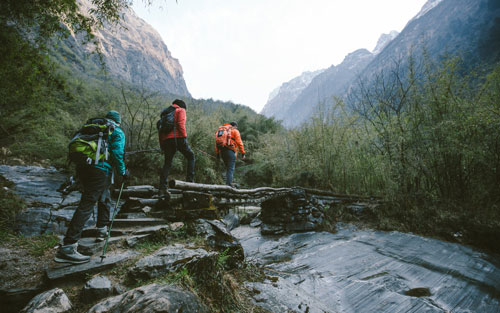
Adventure therapy is an activity-based counseling technique carried out in the wilderness and offers a different approach for those struggling with addiction and other mental health issues. The time spent in the natural world helps change negative behavior patterns, heal past trauma and instill positive feelings of self-confidence and self-compassion.
Studies have shown that spending time in nature has positive psychological benefits. Therefore, it’s understandable that those battling addiction and other negative cognitive behaviors can benefit from the beautiful outdoor surroundings away from civilization provided with this type of psychotherapy.
Clients are assigned activities to perform in the wilderness that require both mental and physical challenges. Going through the process enhances self-awareness and self-esteem and fosters emotional and behavioral growth. The combination of committing to and cooperating within a group sharing similar problems encourages connection, opening up, and acceptance.
All of these ingredients, along with the beautiful backdrop and expert guidance, promotes healthy cognitive changes that help participants heal and overcome their mental health problems so that they can live happier, healthier life.
The Benefits of Adventure Therapy For Addiction
When a loved one or friend struggles with addiction, cognitive changes slowly alter their personality. Often their condition creates mood swings and denial that anything is wrong. People wrestling with addiction begin lying and engaging in inappropriate behaviors. They sleep during the day and stay up all night. When their money to feed the addiction runs out, they often start stealing and breaking the law in other ways.
A breakdown of values takes root, and they begin to push away others. They stay away from social gatherings or hang out with friends that don’t share in their habits. Addiction causes isolation from loved ones and anyone other than those using drugs, as well.
Most addiction stems from past traumas, the accompanying pain too distressing and therefore, numbed through alcohol or drugs.
Adventure-centered therapy seeks to change the behaviors and thinking that caused the client to spiral in the first place. With carefully designed challenges that require emotional and physical endurance, the necessary cognitive shifts begin to occur.
Adventure Therapy Tackles Issues With a Multidisciplinary Approach
Most scientists agree that spending time in nature is healthy for everyone. A plethora of evidence shows that regularly interacting with the natural world affects physical and emotional well-being throughout life. Children and adults have lower blood C-reactive proteins (CRPs) that indicate inflammation. They also have lower cortisol levels, known as precursors to health problems.
Improved mood, higher self-esteem, and better ability to cope with daily stresses cause those enjoying the effects of being outdoors to return for more. Consequently, they usually live longer, happier lives.
Adventure-centered therapy to help someone grappling with a mental disorder dives into the soulful-emotional, cognitive, social, physical, and behavioral aspects of the individual, addressing them through activities, quiet space, group engagement, and counsel. The goal is a transformation brought about by a holistic approach toward the entire person. Elements that help this process include:
- Each individual is part of a group that shares a similar problem. The team learns to trust and rely on one another as they carry out challenging tasks, take expeditions and problem solve in the natural environment. Communication skills, leadership capabilities, and increasing self-assurance begin to emerge. All of this diminishes isolation.
- Camping, kayaking, hiking, and other outdoor activities regulate the natural circadian rhythms of mind and body, establishing a healthy sleep cycle.
- As clients experience physical and emotional success, they start to trust and feel better about themselves and rediscover their true identity.
- By coping with physical challenges in the wild and mastering them, feelings of competency build inner resilience and awareness.
- Provided quiet time away from the pressures and distractions of the modern world result in blossoming self-reflection and mindfulness. At first, the sensation may not be comfortable. Experiencing inner pain, rage, fear, and other emotions the client has tried so hard to resist can feel overwhelming. Counseling provides the acceptance, tools, and support to handle these feelings. Participants make significant progress in personal growth.
- Clients can also reflect on their accomplishments, such as putting up a tent, climbing a rock face, or paddling across a river, and think about their connections with other group members.
- The camaraderie of others sharing their moments of despair and hope not only helps strengthen trust with others but fuels the restorative metamorphosis for everyone. Health professionals provide encouragement and guidance, as well.
- Eventually, the beautiful sounds and sights of nature, a felt connection to it, and the abundance of fresh air and sunlight begin to soothe and heal the psyche and instill a feeling of gratitude toward life.
- Along with recovery comes the guilt and pain of the client’s transgressions and the hurt they have caused others, especially their loved ones. Counselors guide clients through the process of self-forgiveness and help plant the seeds of self-compassion.
Other Components of Adventure-Centered Therapy
 Therapists believe that creating perceived or real physical danger that evokes overpowering emotions activates adrenaline and positive cognitive changes by facing and mastering the situation. Health professionals implement activities that relate to the current and past wounds of participants. This method draws out the necessary lessons and tools to deal with them positively in real life when therapy ends.
Therapists believe that creating perceived or real physical danger that evokes overpowering emotions activates adrenaline and positive cognitive changes by facing and mastering the situation. Health professionals implement activities that relate to the current and past wounds of participants. This method draws out the necessary lessons and tools to deal with them positively in real life when therapy ends.
Mental healing becomes stimulated in the brain as negative thought patterns are called into question and replaced with new neuron connections offering healthier beliefs about themselves. Of course, safety precautions are in place during these activities.
By providing calculated risks, creating a secure emotional environment, and guiding clients through their feelings, valuable life skills are developed to handle and erode behavioral problems, addictions, anxiety, and other mental difficulties. Participants leave with a greater sense of self-worth and self-reliance. Because they’ve had the chance to practice their new behavior in a safe place, it increases the likelihood that their growth will have a lasting effect on their lives.
For effective treatment, education and involvement of those closest to the client, such as family, are instrumental to success. Families can choose to participate in this type of program and/or family therapy to help overcome and repair negative relationship dynamics.
Spending Time In Nature Provides Benefits Beyond Addiction
Adolescents and adults find success with this type of therapy. However, other people can benefit from it, as well, using the same principles addressed above. Someone with an eating disorder, depression, codependency, grief, relationship problems, Post-Traumatic Stress Disorder (PTSD), anxiety, and depression, can find relief and foster strategies that encourage healing.
What Skills Do Participants Gain During Adventure Therapy?
Participants involved in the outdoor therapeutic process begin to experience improved attitudes and a more optimistic outlook on life. They learn how to provide positive and constructive feedback to others and feel comfortable receiving it as well. Clients see, firsthand, that their actions cause consequences and therefore begin to take personal responsibility for their behavior and choices.
By working in a group, members regularly help others and also learn to accept aid. They develop respect and appreciation for others. Furthermore, they practice setting appropriate boundaries when necessary.
These building blocks help participants step out of their comfort zone. They recognize their strengths and weaknesses and become more aware of the unhealthy behavior patterns that controlled them. The inner strength gained from these provided experiences causes clients to move away from denial, positively handle their emotions and take charge of their life.
Research backs this by demonstrating that time spent in the wilderness improves coping mechanisms, cognitive function, attention deficit disorder, feelings of low self-worth, and negative moods. Furthermore, the emotional, behavioral, and social changes obtained appear to be maintained long-term.
Adventure Enhances Mental Health and Overall Sense of Well Being
Most of us would profit from spending more time outdoors. Connecting with nature gives us a strong sense of security and value, that we belong to something wondrous and beautiful. When society’s expectations and pressures get stripped away, we’re left to see the true miracle of who we are and how we fit into life itself.
People who regularly interact with the natural world live a longer, healthier life. They enjoy higher self-esteem and handle life-stresses better. They tend to eat healthier and have positive social relationships, as well. In contrast, people who spend most time indoors end up feeling disconnected from society. They experience more distress and less ability to handle life’s ups and downs.
Whether you regularly enjoy activities in nature or plan to make it part of a therapy treatment, you’ll leave with a more positive sense of self and a hopeful attitude toward the future.
If adventure therapy sounds like a good choice for you or a loved one, contact us today and set up a consultation. We can discuss our group programs and which ones seem like the right fit for you. We’re here to help you start on an amazing journey of personal growth and a happy, healthy long life ahead. The best time to start is now.
References:
Ecotherapy: A Forgotten Ecosystem Service/Frontiers in Psychology
Definition of Adventure Therapy/Association for Experiential Education
Characteristics of Drug-Dependent People/National Institutes of Health
A Meta-Analysis of Adven… Therapy Outcomes and Moderators/The Open Psychology Journal


